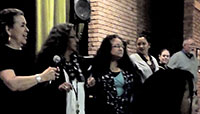Duluth Indigenous Commission
One of the major organization which seeks to aid Native Americans in the city, the Duluth Indigenous Commission, formerly the Duluth American Indian Commission. The commission was created in April 2002 by the Duluth City Council. Its purposes, as stated on the City of Duluth’s website, are as follows:
- To ensure that the views of the American Indian community are incorporated in the decision making, future planning, and stewardship of the city of Duluth.
- To endeavor to act as a guide in the development of public policy, planning and services so that the American Indian community is adequately represented in these processes and increase understanding and acceptance of the American Indian community and culture.
- To increase American Indian community involvement in all aspects of community affairs in Duluth.
In March 2013, the commission voted to change its name to the Duluth Indigenous Commission and to adopt new bylaws:
As a commission we are committed to building alliances with governmental, Tribal, and community partners that will support the restoration of Indigenous cultural values and principles, thereby creating collaborative relationships between Indigenous and non-Indigenous citizens.
In 2012 the Commission launched a three-year process to study and make better known the Native American heritage of the city of Duluth. This study, called the "Duluth Ethnographic Study" was funded by the Minnesota Historical Society with Legacy Funds appropriated by the Minnesota Legislature. The study was motivated in part by a feeling among Native Americans in the city that they were invisible, that their tie to the place and to its history was little known. Commission and community members also described the racism toward Native people existing in the city. To help remedy this situation the study involved archaeology and history studied through documents and oral interviews. Bruce White of Turnstone Historical Research, local historian Mike Flaherty, and Eva Terrell and Michelle Terrell of Two Pines Resource Group, completed the study in July 2012. The study is available in pdf form here: Duluth Ethnographic Study, 2015
Ricky Defoe, who was the chair of the Indigenous Commission during the time the Ethnographic Study was under way, expressed his understanding of the challenges faced by Native people in the city:
My last name is DeFoe, which is French. The city of Duluth is French-named. Fond du Lac is a French word. But I was never raised a French boy, a Frenchman. Society tells you who you are. When I went to school here in Emerson and the other elementary schools and junior high, they told you you were an Indian, and all those stereotypes that come along with that will be applied to you. So it was … and there was negative connotations that come with being Indian, especially were hurtful. And I think that plays a part, too, in somebody’s trajectory in life. People don’t realize the impact racism has on the health and well-being of a community. When they tie that into, let’s say, healthcare, and then we wonder why things are exacerbated, and all the statistics show what they do at the natives there at the bottom.
After the completion of the study, members of the Commission continue to seek to use its findings to educate members of the public to the history and contributions of Native people in the city. At the September 2015 Feast and Forum, an annual event during which members of the Commission meets with the community it serves, the Ethnographic Study was the main topic of discussion. Several members of the Commission and the Community told stories reflecting their experiences in the Duluth area.
Copyright © 2022. All rights reserved.



